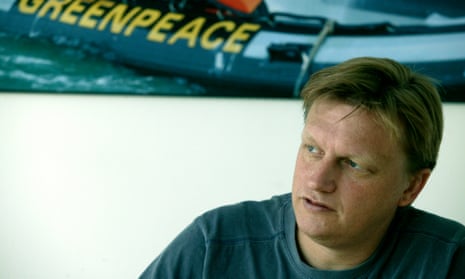The environmentalist Stephen Tindale, who has taken his own life at the age of 54, was an influential backroom figure in the Labour party who became executive director of Greenpeace UK. His brand of environmentalism was driven by his socialist principles. He was international in outlook, pragmatic about what could be achieved politically, and technologically optimistic. He was successful as a leader, first in government and then outside it.
Heading Greenpeace from 2001 until 2006 was Stephen’s most public-facing role, at a time when the organisation was at its noisiest. In 2005 he was arrested during direct action at Range Rover’s SUV plant in Solihull. Greenpeace planted a flag subverting the company’s logo and proclaiming “Land Rover: Climate Criminals”. Stephen was proud of this act of civil disobedience and a framed image of his arrest adorned his wall.
But his strength as an environmentalist – his ability to question perceived wisdoms, his intellectual curiosity and his desire to come up with a nuanced solution – did not always sit well with Greenpeace’s opposition to entire sectors or technologies. Stephen was uncomfortable with the reliance on scare tactics used to gain attention, rather than putting forward a positive vision for sustainability. He was proud that during his tenure Greenpeace played a critical role in the birth of the offshore wind industry in the UK.
In later years, he became best-known for breaking with positions he had held in Greenpeace. Stephen argued that since the principal problems with nuclear power were nuclear waste and weapons proliferation, the solution was advanced reactors that could mitigate these. In a similar spirit, he argued that genetically modified organisms should not be rejected en masse – some genetic alterations to crop or bacteria were benign and would lead to environmental improvement and better food security. These stances won Stephen many new supporters, but hurt relationships with some of his environmentalist peers and friends. He made these changes based on principles he always held dear, inspired by the urgent need to prevent climate change.
He was born in Baghdad, the son of Sonia and Gordon Tindale. His father worked for the British Council and Stephen’s early childhood was spent in the Middle East and Africa. He went to the Leys school in Cambridge and studied philosophy, politics and economics at St Anne’s College, Oxford, then took a master’s in politics and administration at Birkbeck College London.
He joined the Foreign Office in 1986, but gave up the security and prestige of this job to work on environmental issues. He worked for Friends of the Earth and at the Fabian Society, led the energy team at the Institute for Public Policy Research (1994-96), and was director of the Green Alliance (1996-97).
Many of his colleagues went on to become government ministers in the Blair-Brown era. This creative period incubated much of the Labour party’s thinking on renewable energy, and on green taxation, such as carbon taxes, the escalation of fuel duty and landfill tax. Stephen worked for the party’s shadow environment secretary, Chris Smith, on the strategy In Trust for Tomorrow, published in 1994. This set the tone for Labour for the next decade, outlining the right to roam, justice for future generations and the creation of the environment audit committee.
After the 1997 general election, environment was subsumed into a sprawling department that combined local and regional government, transport and environment. Stephen joined as adviser to the environment minister Michael Meacher. His role was to represent Meacher within the department, to be his “vicar on earth”. Meacher was not always on the same page as his civil servants and sometimes only accepted advice once Stephen had persuaded him about the idea’s merits from first (socialistic) principles.
Over three fruitful years, Britain signed the Kyoto protocol, launched the climate change levy and passed right-to-roam legislation despite vociferous opposition from landowners. Stephen was invariably witty and charming in explaining and defending policy decisions. The climate change levy, a tax on energy rather than carbon, emerged as a political compromise between the ideals of environmental taxation and the realities of trying to get such a market-based approach to be adopted by a Labour party with deep political roots in the coal industry.
Stephen left government in 2000 to join one of its staunchest critics – Greenpeace – and a year later he became executive director. But he found leading Greenpeace’s passionate but vociferous staff, and implementing its global campaign priorities, exhausting. Stephen suffered from depression all his adult life, and when, in 2006, he left Greenpeace, it was after an attempt to take his own life. His physical recovery took a year and his health was never fully restored.
After Greenpeace, Stephen could voice his views more freely. He set up a website, climateanswers.info; he and I wrote a book, Repowering Communities (2011), advocating small-scale and local energy solutions; and he wrote on environmental issues for the Centre for European Reform. He also campaigned tirelessly for renewables, including novel technologies such as the Swansea tidal lagoon.
Friends remember Stephen’s friendliness, his gentlemanly charm, his approachability, his warmth, his self-deprecating humour, his blokeish passion for Spurs and his love of debate, preferably over a pint of bitter, or better still while hiking on a Munro.
Stephen was twice married and divorced. He is survived by the son and daughter of his first marriage, and by his sister, Helen, and his parents.
